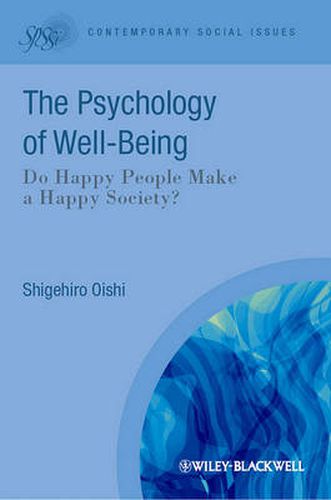Readings Newsletter
Become a Readings Member to make your shopping experience even easier.
Sign in or sign up for free!
You’re not far away from qualifying for FREE standard shipping within Australia
You’ve qualified for FREE standard shipping within Australia
The cart is loading…






The main goal of this book is to show the intricate relationship between individual and societal well-being. The psychological science of well-being has focused almost exclusively on individuals’ well-being (e.g., life satisfaction, the frequency of positive emotional experiences). Consequently, we know a great deal about predictors of well-being (e.g., personality traits, quality of close relationships) and consequences of well-being (e.g., income, educational attainment, relationship stability). In contrast, we know little about whether the aggregate well-being of happy individuals will give rise to a happy, healthy, well-functioning society (e.g., low crime rate, low corruption, economic vitality, low homicide, low suicide, high rate of pro-community action, high level of civic engagement). The central question for this book is the following: Do happy people make a happy society? The answer to this question is not straightforward. There is some evidence to support the idea that happy individuals create a happy society (Lyubomirsky, King, & Diener, 2005), as happy individuals are known to be more sociable, caring, and positive around others. However, there is also evidence that some socio-ecological factors promoting an individual’s pursuit of happiness (e.g., residential mobility) can be detrimental to the well-being of communities (Sampson et al., 1997). Thus, the second critical question at the intersection of individual and societal well-being is the following: How can we maximize individuals’ happiness, while also maximizing societal happiness? The main thesis: although happiness is associated with a myriad of positive outcomes (e.g., income, marital stability), maximizing individual happiness (e.g., freedom and residential mobility) might undermine societal well-being via undermining intermediate institutions such as neighborhood and workplace social network. I will then discuss how we can reach the intricate balance maximizing both individual happiness and societal well-being. To this end, I will try to identify the optimal levels of freedom, residential mobility, economic resources, and interpersonal resources that produce maximum levels of well-being for individuals and for society. Over the last twenty years, subjective well-being research has exploded in psychology, as well as in related disciplines such as sociology and economics. Although a number of reviews and books have been published on subjective well-being, researchers in this area have paid little attention to the relation between subjective and societal well-being. This is the first book to explicitly address the issue of societal as well as personal well-being.
$9.00 standard shipping within Australia
FREE standard shipping within Australia for orders over $100.00
Express & International shipping calculated at checkout
The main goal of this book is to show the intricate relationship between individual and societal well-being. The psychological science of well-being has focused almost exclusively on individuals’ well-being (e.g., life satisfaction, the frequency of positive emotional experiences). Consequently, we know a great deal about predictors of well-being (e.g., personality traits, quality of close relationships) and consequences of well-being (e.g., income, educational attainment, relationship stability). In contrast, we know little about whether the aggregate well-being of happy individuals will give rise to a happy, healthy, well-functioning society (e.g., low crime rate, low corruption, economic vitality, low homicide, low suicide, high rate of pro-community action, high level of civic engagement). The central question for this book is the following: Do happy people make a happy society? The answer to this question is not straightforward. There is some evidence to support the idea that happy individuals create a happy society (Lyubomirsky, King, & Diener, 2005), as happy individuals are known to be more sociable, caring, and positive around others. However, there is also evidence that some socio-ecological factors promoting an individual’s pursuit of happiness (e.g., residential mobility) can be detrimental to the well-being of communities (Sampson et al., 1997). Thus, the second critical question at the intersection of individual and societal well-being is the following: How can we maximize individuals’ happiness, while also maximizing societal happiness? The main thesis: although happiness is associated with a myriad of positive outcomes (e.g., income, marital stability), maximizing individual happiness (e.g., freedom and residential mobility) might undermine societal well-being via undermining intermediate institutions such as neighborhood and workplace social network. I will then discuss how we can reach the intricate balance maximizing both individual happiness and societal well-being. To this end, I will try to identify the optimal levels of freedom, residential mobility, economic resources, and interpersonal resources that produce maximum levels of well-being for individuals and for society. Over the last twenty years, subjective well-being research has exploded in psychology, as well as in related disciplines such as sociology and economics. Although a number of reviews and books have been published on subjective well-being, researchers in this area have paid little attention to the relation between subjective and societal well-being. This is the first book to explicitly address the issue of societal as well as personal well-being.